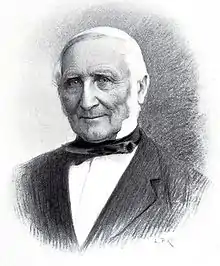Frédéric Louis Godet
Frédéric Louis Godet (October 25, 1812, Neuchâtel–October 29, 1900, Neuchâtel) was a Swiss Protestant theologian.
| Frédéric Louis Godet | |
|---|---|
 | |
| Born | 25 October 1812 Neuchâtel |
| Died | 29 October 1900 Neuchâtel |
Biography
Godet was born on October 25, 1812, in Neuchâtel.[1] His father, Paul-Henri,[1] who was a lawyer, died early. His mother, Eusébie née Gallot, a pious, strong and intelligent pastor's daughter, who founded a girls' school, devoted herself to his early training.[2]
He conducted preparatory studies in Neuchâtel, and then studied theology in Berlin and Bonn.[1] There, he came into contact with the leading theologians of the day, like Hengstenberg, Tholuck, Nitzsh, Steffens, Neander and Schleiermacher. Of these, Neander exerted the greatest influence on him. Important spiritual influences came from Otto von Gerlach and Baron von Kottwitz, ensuring an emphasis on piety rather than mere intellectualism.[3] Nikolaus von Zinzendorf and Johannes Gossner also helped him overcome a spiritual crisis and come to a wholehearted commitment and faith in God's grace.[2]
Upon graduation in 1836, he returned to Neuchâtel, where he was ordained to the ministry and became pastor of two small parishes.[1] In 1838, however, he returned to Berlin in order to succeed his mother as tutor for the crown prince, Frederick William of Prussia. The prince was a receptive pupil for the clergyman, who taught him fear of God, and Godet remained a close friend of the Emperor to be for the rest of the latter's life.[2][4] When he left Berlin, in 1844, he received a lifetime pension from the Prussian royal family, and was appointed chaplain to the Prince Royal of Prussia William I.[1]
He retained the position until 1844, when he once again returned to his home town, where he became deacon of the churches of Val-de-Ruz (1844-1850)[1] He devoted himself with great energy to the practical works of the churches, organizing Sabbath schools and other agencies. The same year he married Caroline Vautravers.[2] In 1850, he was appointed professor of theology at Neuchâtel, having charge of New Testament Criticism and Exegesis, and later also of Old Testament Introduction.[1] From 1851 to 1866 he also held a pastorate in Neuchâtel, and he tirelessly set up religious agencies and philanthropic associations.[2]
By 1873, the Church of Neuchâtel had lost both its freedom and its orthodoxy, as the state passed a law that made every citizen a member of the church by virtue of his birth, and ministers were declared eligible for office apart from subscription to any creed. In response, Godet became one of the founders of the free Evangelical Church of Neuchâtel, and professor in its theological faculty.[3]
He retired in 1887, and was succeeded as professor by his son George. Afterward, he continued to publish. Godet did much to interpret German theological thought to French–speaking Protestants, and the English translations of his works made him influential in international NT scholarship.[1] Godet Died on October 29, 1900, in Neuchâtel. Another son of his, Philippe Godet, became a professor of French literature at University of Neuchâtel and published his biography in 1913.
Theology

Godet was the author of some of the most noteworthy commentaries of the time,[5] which have been translated into many languages and are still in print, as well as numerous articles. His Commentary on the Gospel of John, which continues the line of interpretation of Christoph Ernst Luthardt, ranks as the most prominent of his works. Throughout his works, he defends the authenticity and reliability of the New Testament, and particularly the gospels,[6] although he did not commit himself to the plenary inspiration of the Scriptures.[7]
Rejecting the Calvinist position on predestination, Godet has often been appealed to by Arminian theologians.[8] In Christology, he held the modernist kenotic theory of Wolfgang Friedrich Gess, according to which incarnation meant, not the assumption of two distinct states by one subject, but the voluntary reduction of a divine subject to the human state. His work contributed to changing the ways of approaching the kenotic motif among New Testament scholars.[9][10][11] Regarding atonement, he affirmed a reconciliation of God to man as well as man to God, but was regarded by some as thinking that Christ's sufferings met the divine claims in relation to sin not by satisfying and compensating but by revealing and recognising them, thereby expressing the Moral influence theory of atonement and the Governmental theory of atonement. But compare the first page of the preface to the book of Romans. In his The Six Days of Creation, he argued, following Hugh Miller, for an old earth.[12]
In addition, he was a staunch defender of evangelical Christianity against supporters of liberal Protestantism such as Ferdinand Buisson.[1]
Awards
- Doctor "honoris causa" from University of Basel and University of Edinburgh.[1]
Works
Translated in English
- Godet, Frédéric (1879). Commentary on the Gospel of John: with an historical and critical introduction. 1. 3 volumes. Edinburgh: T. & T. Clark.
- Godet, Frédéric (1879). Commentary on the Gospel of John: with an historical and critical introduction. 2. 3 volumes. Edinburgh: T. & T. Clark.
- Godet, Frédéric (1879). Commentary on the Gospel of John: with an historical and critical introduction. 2. 3 volumes. Edinburgh: T. & T. Clark.
- Godet, Frédéric (1883). Commentary on St. Paul's Epistle to the Romans. 1. 2 volumes. New York: Funk & Wagnalls.
- Godet, Frédéric (1883). Commentary on St. Paul's Epistle to the Romans. 2. 2 volumes. New York: Funk & Wagnalls.
- Godet, Frédéric (1889). A Commentary on the Gospel of St. Luke. 1. 2 volumes. Edinburgh: T. & T. Clark.
- Godet, Frédéric (1889). A Commentary on the Gospel of St. Luke. 2. 2 volumes. Edinburgh: T. & T. Clark.
- Godet, Frédéric (1889). Commentary on St. Paul's First Epistle to the Corinthians. 1. 2 volumes. Edinburgh: T. & T. Clark.
- Godet, Frédéric (1889). Commentary on St. Paul's First Epistle to the Corinthians. 2. 2 volumes. Edinburgh: T. & T. Clark.
- Godet, Frédéric (1889). Studies on the Epistles of St. Paul. New York: Hodder and Stoughton.
- Godet, Frédéric (1873). Studies on the New Testament. London: Hodder and Stoughton.
In French
- Godet, Frédéric (1849). Trois dialogues sur la loi ecclésiastique (in French). [Neuchatel]: [Wolfrath].
- Godet, Frédéric (1859). Histoire de la Réformation et du Refuge : dans le Pays de Neuchâtel (in French). Neuchatel: Librairie L. Meyer et Comp.
- Godet, Frédéric (1872). Commentaires sur l'Évangile de saint Luc (in French). 1. Paris: Librairie Sandoz et Fischbacher.
- Godet, Frédéric (1872). Commentaires sur l'Évangile de saint Luc (in French). 2. Paris: Librairie Sandoz et Fischbacher.
- Godet, Frédéric (1876). Commentaire sur l'évangile de Saint Jean (in French). 1. Paris: Librairie Sandoz et Fischbacher.
- Godet, Frédéric (1865). Commentaire sur l'évangile de Saint Jean (in French). 2. Paris: Librairie française et étrangère.
- Godet, Frédéric (1877). Commentaire sur l'évangile de Saint Jean (in French). 3. Paris: Librairie Sandoz et Fischbacher.
- Godet, Frédéric (1883). Commentaires sur l'épître aux Romains (in French). 1. Neuchatel: Librairie J. Sandoz.
- Godet, Frédéric (1890). Commentaires sur l'épître aux Romains (in French). 2. Paris: Librairie Grassart.
- Godet, Frédéric; Gretillat, Augustin; Monvert, Charles; de Coulon, Paul; Bovet, Félix (1898). La Bible annotée : Ancien Testament (in French). Neuchâtel: Attinger Frères.
- Godet, Frédéric (2006). Introduction au NT : les évangiles synoptiques (in French). 1. [Paris]: ThéoTeX.
- Godet, Frédéric (2006). Introduction au Nouveau Testament : les Épîtres de Paul (in French). 2. [Paris]: ThéoTeX.
- Godet, Frédéric (2008). Commentaires sur la première épître aux Corinthiens (in French). [Paris]: ThéoTeX.
- Godet, Frédéric (2010). Études Bibliques (in French). [Paris]: ThéoTeX.
Notes and references
Citations
- Hammann 2005.
- Montan 1914.
- Salmond 1885.
- Stoddard 1913.
- . Encyclopædia Britannica. 12 (11th ed.). 1911. pp. 171, 172.
- Godet, Frédéric Nordisk familjebok, 1908.
- Carl F.H. Henry (Ed.): Contemporary Evangelical Thought
- Steven Kyle Reader: The Meaning of Foreknowledge in Romans 8:29 and Its Ecclesiastical Implications Thesis at the Southern Baptist Theological Seminary, May 2015.
- Donald G. Dawe: The Form of a Servant: A Historical Analysis of the Kenotic Motif p. 24, 134. Eugene, OR, 2011.
- David Fergusson (Ed.): The Blackwell Companion to Nineteenth-Century Theology p. 262f., 269. John Wiley & Sons 2010.
- David Brown: Divine Humanity: Kenosis Explored and Defended p. 69-75. London, 2011.
- Salmond 1985.
Sources
- Montan, Gustaf (1914). "Frédéric Godet. Hans lif och personlighet". Bibelforskaren. Tidskrift för skrifttolkning och praktisk kristendom (in Swedish). 13.
- Salmond, S.D.F. (1885). "Fréderic Godet" (PDF). The Expositor. 3. 13 (6).
- Stoddard, Jane T. (1913). "A Swiss Fénelon: Dr. Godet and the Emperor Frederick" (PDF). The Expositor. 8. 5 (5).
- Hammann, Gottfried (2005). "Frédéric Godet". Dictionnaire historique de la Suisse (in French). London: Smith, Elder & Co.